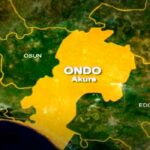
TWO recent kidnapping incidents on the Lagos-Ibadan Expressway and in Ekiti State underline the growing insecurity in South-West Nigeria. At the Ibadan, Oyo State end of the expressway, suspected Fulani bandits attacked travellers on October 27, abducting five persons and killing several others. Two days after, seven bandits struck in Irele-Ekiti, also abducting four travellers. These attacks denote the failure of the region’s state governors to join forces effectively and arrest the dangerous drift into anarchy. Unless they act now and decisively, the region could end up like parts of the North where life has become brutish, and travel, farming and commerce hazardous.
Strikingly, the two attacks occurred in daylight; the one in Irele-Ekiti at 11 am; the Ibadan incident at between 5 pm and 6 pm, according to the police. This is audacious, proving that criminals can operate at will.
In the expressway attack, the daring gunmen repelled the police before killing those who resisted them and capturing several travellers whom they took into the forest. This is a frightening breakdown of security on the country’s major highway and access to Lagos, the country’s commercial and industrial hub. It also confirms long voiced alarms that the South-West forests are infested with bandits.
Victims in the attacks restated how the kidnappings callously murdered those whose families were unable to pay ransom. One victim, Adigun Agbaje, a former Deputy Vice-Chancellor of the University of Ibadan, said, “I was released by my kidnappers after spending two nights in the thick forests of Ogun and Oyo states. My mind goes to the five others who are still left with the kidnappers: two young ladies, two young men and a middle-aged person. I was shot in the head during the abduction.”
Another victim, Aminat Taiwo, 22, said, “Those kidnappers were more than 30; they covered their faces. They were putting on army and police uniforms. At first, we thought they just wanted to rob us, but to our greatest surprise, after stripping us of everything we had, they asked us to start moving inside a deep forest. We walked for more than two hours inside the forest.”
Many other victims have been recounting similar gory encounters across the South-West highways, farms, and forests in the past few years. On the watch of the indifferent state governors, some of who in their desperation for access to the spoils of national office, are aligning with the faction of the Nigerian ruling class that openly backs the killers, a reign of terror is unfolding.
Amid a massive influx of Nigerian and foreign marauders from the North and beyond the country’s borders, the South-West governors are cynically fixated on politics. Yet, Nigerian security officials have accepted that Boko Haram and ISWAP Islamic terrorists have teamed up with Fulani herdsmen/militants and bandits (who are also mainly Fulani). Terrorism, which is difficult to defeat, looms in the region.
The first duty of any government is the security of lives and property. But the region is brimming with criminals of diverse hues, including Fulani herders destroying farms, kidnapping, raping and killing. Today, residents are afraid to travel across the region for social activities, farming or business. The economy of the region is heading towards the desolation that prevails in the northern states.
With few exceptions, the governors treacherously failed to act on repeated warnings, attacks and strident alerts on the invasion of the region. Gani Adams, the leader of the O’odua Peoples Congress, and the self-determination agitators like Sunday ‘Igboho’ Adeyemo, and many victims of the bandits have repeatedly cried out. Kunle Togun, a retired army brigadier-general and former intelligence chief, confirmed repeatedly that foreign marauders had surrounded entire South-West.
Though five of the South-West states have set up the regional security corps, Amotekun, only Ondo is very vigorous in making it work, others appear lukewarm. Lagos has not, as its government and ruling political faction pursue their political ambitions.
In reaction to the brutal murder of Funke Olakunri, the daughter of Pa Reuben Fasoranti, the Yoruba leader, on the Akure-Owo Highway in July 2019 by Fulani elements, the South-West governors had established the Amotekun.
But the governors are distracted by partisan politics ahead of 2023 and Amotekun has not developed the necessary decisive bite. Only Governor Rotimi Akeredolu of Ondo demonstrates resolute visible zeal, equipping the corps and funding it. While four others have actually established Amotekun, with varying degrees of funding and commitment, unlike Akeredolu, they do not demonstrate appreciation of the enormity of the existential threat posed by the terrorists. Bloody attacks, kidnappings reported on the highways, and the terrorist shooting at the St. Xavier Catholic Church in Owo, Ondo State, in which 42 worshippers were killed and scores wounded should wake them up.
Akeredolu’s quest to equip the Amotekun corps with modern weapons has met with arrogantly stiff opposition from the northern-dominated federal security agencies. He should not be deterred. Other governors should join in this objective.
Adeyemo came to prominence when he embarked on a mission to liberate his Oke-Ogun community from the grip of Fulani herdsmen vagrancy and kidnapping. In that part of Oyo State, farming is still endangered, as herdsmen cum kidnappers run riot.
The criminals like the Fulani bandits in the North, burn farmlands, and rape and torch property. Strangely, the region’s governors fail to implement their anti-open grazing laws or enforce bans on commercial motorcycle operations.
The security breakdown in the North should serve as a warning. A former Chief of Army Staff, Theophilus Danjuma, has reiterated his earlier call on Nigerians to rise in self-defence. “In 2017 when I called on the people to defend themselves, a kangaroo commission of enquiry was set up to investigate and they said I was lying because there was no evidence,” the former Minister of Defence said. “Today in the country, there is evidence everywhere; the foreign bandits are killing and taking over lands in all the places. I will not give you arms, you have to find out how the bandits got and find yours too.”
The South-West stakeholders should listen. The failure of the national security architecture is glaring. Relying on the shambolic regime of the President, Major General Muhammadu Buhari (retd.), for security is suicidal. The Nigerian Security Tracker of the Council on Foreign Relations counted 53,480 persons killed by terrorists between May 29, 2015 and October 15, 2022. This body count is higher than that of some ongoing wars around the world.
Therefore, the six governors should consign politics to the backburner and jointly live up to their calling as chief security officers of their states. This starts with Lagos establishing the Amotekun corps. Sanwo-Olu should decide whether he wants to remain permanently subservient to private and outside interests or to serve Lagosians. The other five states should recruit more officers, training and retraining them for the demands of the job. They should enforce the anti-open grazing laws.
With more officers, equipment, and technology, Amotekun should engage in round-the-clock patrols on the state and interstate highways. The governors should prioritise intelligence, the acquisition of drones and invest in equipment that will help locate the kidnappers in their hideouts, and flush them out of the forests.
But the people should no longer be complacent; they should mobilise at every level, community, local government level, state and region-wide to demand effective security and good governance from their governors. Through protests, rallies, petitions, sit-ins and other public campaigns, they should focus on Danjuma’s insightful admonition; continuing to wait for the government and security agencies is surrender to the marauders.
Nigeria is a federal state. The security arrangement in the other 24 federal countries in the world is police devolution. From Australia to Germany, Brazil to Belgium, Sweden to Switzerland and Canada to the United States, security is highly devolved. The United Kingdom, a unitary state, recognises the importance of police devolution by having 43 police forces. This imposes a duty on the governors to jointly demand the proper arming of Amotekun. They should act quickly before it become too late.





